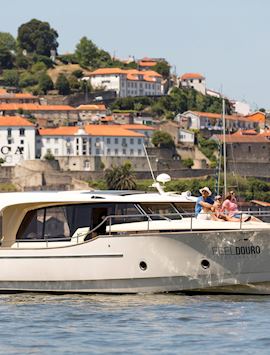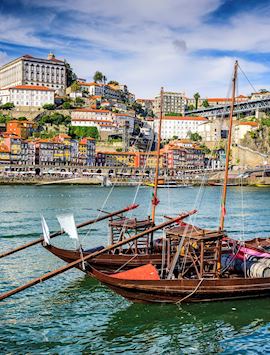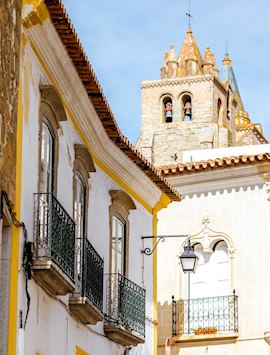By Portugal specialist, Corinne
Cooking alongside a Portuguese chef, horse riding through vineyards, sailing traditional rabelo boats along the Douro River, soaking in the hot springs of São Miguel in the far-flung Azores… honeymoons in Portugal are never short of romance. For a country that offers pristine beaches, wild scenery, rich culture, not to mention full-bodied wine, it’s hard to know where to start when you’re planning your honeymoon, so I’ve put together a few inspirational highlights to give you a helping hand.
I have booked plenty of honeymoons to this wonderful country and there’s nothing more important than getting this trip spot-on for every client. Below are a few of my best honeymoon tips for Portugal but we can tailor your trip to fit entirely around your own passions and dreams as a couple — after all, this really is a once in a lifetime adventure.
Where to go on honeymoon in Portugal
It’s possible to include several different locations across one Portugal honeymoon, so I would suggest looking through these ideas and then we can discuss how to mix them together. If you want to build some downtime into your itinerary, I highly recommend the chic beach retreats of Comporta, an oceanside slice of luxury. If your idea of relaxation is more spa focused, the One and Only Douro Valley combines an extensive treatment menu with an expansive cellar featuring the region’s prestigious wines.
However, if you’re more interested in hiking or Portugal’s culture, taking time to explore Porto or Lisbon and mixing this up with some time spent out in the Azores might be the perfect combination for you. Below I have put together a top-ten list of my highlight honeymoon destinations in Portugal and a taste of the experiences that are on offer in each. I hope that it inspires you to start planning your own romantic trip.
Browsing boutiques and beaches in the Western Algarve
Despite some rather glaring overdevelopment in certain parts, the Western Algarve includes some indulgent relaxation mixed with bountiful beaches, browse-worthy boutiques and a good dose of nightlife.
If food is the language of love in your relationship, you may be interested in a private cooking course in the historic town of Faro, where you’ll learn how to make the Algarve’s signature seafood dish — cataplana. Accompanied by a professional chef, you’ll start with a market tour to purchase the key ingredients and then wind your way through the narrow streets of the town to his restaurant, where you’ll use the kitchen to prepare your meal under his guidance.
In Lagos, we can arrange a privately guided coastal hike for you both, heading out along the coastline following the soaring sandstone cliffs with their panoramic seascape views. Nothing beats getting onto the water here too, and you’ll hop aboard a private coastal cruise around the caves and bays of the area, stopping to enjoy refreshments together or to swim in the tantalizingly clear waters.
Where to stay in the Western Algarve
There are two hotel choices in this area that really stand out for a honeymoon in the western Algarve. Casa Mãe in the heart of historic Lagos is a chic, boutique townhouse with private, self-contained, cabana rooms surrounded by extensive kitchen gardens that back onto the original city walls. The separate spa building boasts a salt-water rooftop swimming pool and multiple treatment options. It’s a short walk from here into the boutiques and bars of the town.
If you’d rather be slightly out of the hubbub, Cascade Wellness Resort is a peaceful retreat built on the cliffs of Lagos, with staggering views out over the Atlantic. This hotel is a haven for wellness and its spa offering includes couples’ treatments — ideal for honeymooners. With its pool, Turkish bath, Jacuzzi, sauna and fully equipped gym, it is often hard to tear yourself away from the relaxation on offer here.
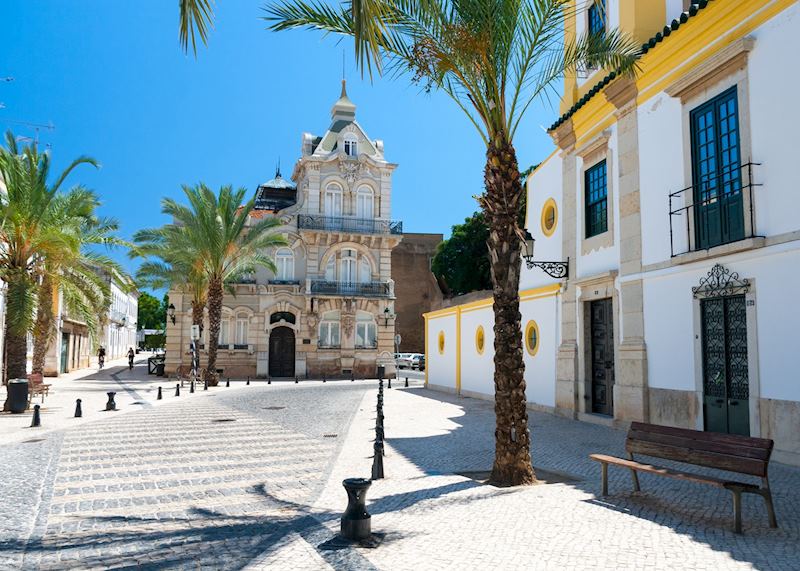
Drifting through nature reserves in the Eastern Algarve
For a more culturally immersive, intimate and secluded honeymoon on the Algarve, I would suggest heading to the eastern edge of the region, with its pristine nature reserves, olive groves, and cork oak orchards.
The area around the historic town of Tavira boasts some of the least developed beaches in the whole of Portugal, forming a part of the protected Parque Natural da Ria Formosa, a nature reserve of saltwater lagoons that attracts abundant birdlife. We can arrange for you drift around this reserve together on an eco-boat tour.
Alternatively, you can head out to your own honeymoon beach, taking the public ferry to Ilha de Tavira, where you’ll find miles of powdery soft beaches backed by marram grass and fronting onto aquamarine water.
You may also want to visit the area’s famed cork factories in a half-day guided tour, wander the narrow streets of Tavira town up to the 8th-century castle of Castelo de Tavira, or explore the small town of Moncarapacho.
Where to stay in the Eastern Algarve
For a honeymoon in Portugal’s eastern Algarve, I have two ideas for romantic hotels. Either Grand House, which sits just across from the Spanish border and exudes 1920s charm and luxury with chandeliers and portraits offset by fresh white linens and calming, neutral accents. The hotel has a rooftop bar and a beach club, just a five-minute shuttle bus away, where you can relax by the pool or in the sea.
Alternatively, you could stay at Octant Vila Monte, a rustic, boutique retreat close to the coastal town of Olhão in the heart of the Algarve. Rooms here spread across the gardens of citrus, olive, and carob trees and the restaurant has terraced seating with views across the rolling hillside to the sea. As an enticing daytrip, the hotel offers a shuttle bus and boat service to a beach not accessible by public transport. They’ll even pack you a sublime picnic lunch to take with you.
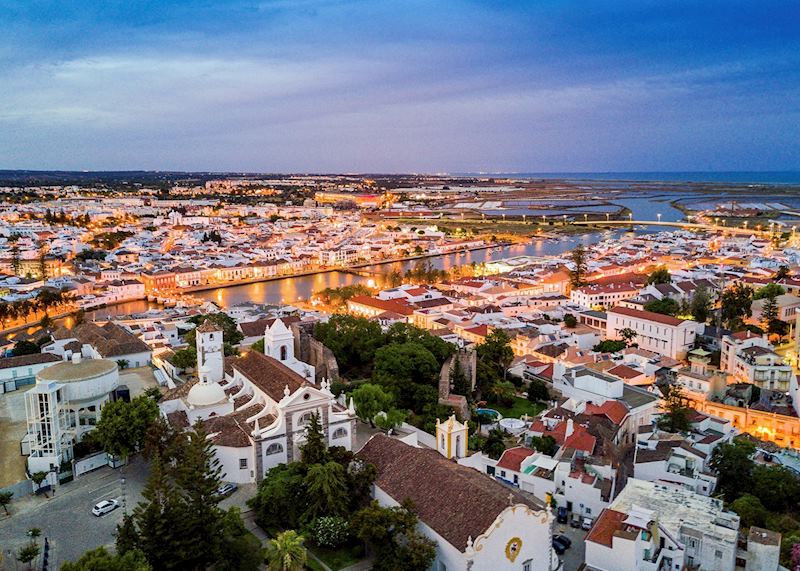
Horse riding through vineyards
Heading to the Alentejo region will take you deep into the rural heart of Portugal for your honeymoon. Here you’ll find huge, rolling fields of wheat crops, smatterings of cork oat forests, dusty heat-baked vineyards, and wineries producing some of the very best of Portuguese wines. Évora is the region’s capital — a medieval walled city and UNESCO World Heritage Site with Roman ruins, a Gothic cathedral, and Moorish architectural influences throughout. A honeymoon here will give you a good insight into the authentic Portuguese way of life, as well as introducing you to the history, cuisine, and wines of this fertile region.
We can arrange for you to have a privately guided walking tour of Évora, where your guide will accompany you through the winding streets to the city’s main sites including the Templo Romano and the roof top panorama of the cathedral. Out in the countryside, you’ll have a choice of wine tasting trips and private winery tours, as well as horse riding treks around the vineyards and hillsides of the Alentejo.
Where to stay in Évora and the Alentejo
For a honeymoon in Évora and the Alentejo, you could hop between two romantic hotel options.
In the city of Évora, the Pousada Convento de Évora sits calmly within a 15th-century monastery directly opposite the Templo Romano. It's a historical haven with tapestries and frescoes adorning walls, relaxing cloisters surrounding citrus gardens, and stone staircases leading to a palm-lined pool.
Herdade de Malhadinha Nova Country House and Spa on the other hand, is deep in the rural Baixo Alentejo region — quietly regarded as one of Portugal’s best-kept secrets. The result of an environmentally focused renovation of a historic winery, the hotel is owned and run by a local family, the grandmother still works here.
Rooms and suites are built across the original farmhouse and outbuildings, taking advantage of the sweeping rural views. The farm-to-fork restaurant menu is overseen by chef Joachim Koerper, who holds a Michelin star at his Lisbon restaurant. You can opt to enjoy the hotel’s second-to-none with introductory classes in beekeeping, archery, cookery, and more.
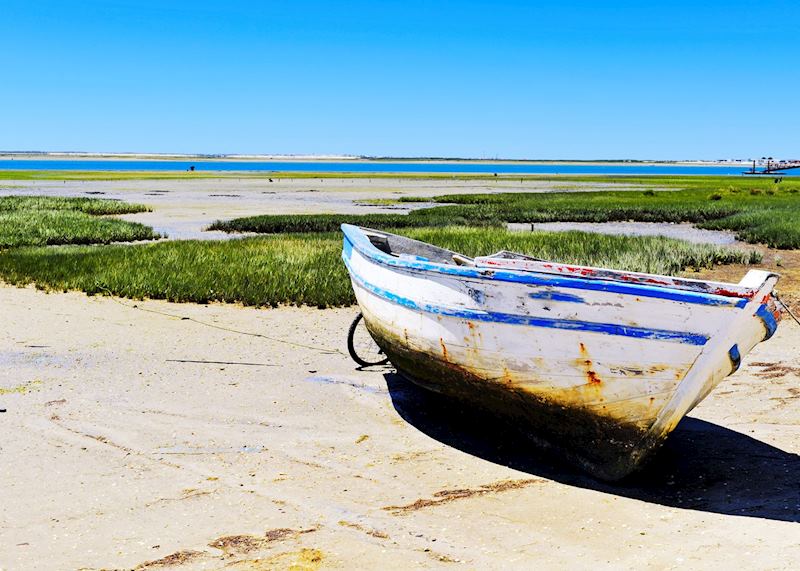
Sail a rabelo boat along the Douro River
A honeymoon in Portugal’s Douro Valley is a chance to immerse yourself in one of the world’s most famous and revered wine regions, demarcated and protected since the mid-18th century for its port wine production. The magnificent Douro River weaves its way along the steeply sloping valley, which is lined with hand-carved, terraced vineyards.
Wine produced here was once taken along the river aboard traditional rabelo boats to the cellars of Porto, from where it was exported out across the Atlantic Ocean. For a romantic introduction to this area, not to mention the best views, you can follow the same route with a private boat cruise along the Douro River. You’ll dock at several wineries for tastings along the river and stop midway at a well-known quintas (wine estate) for a picnic lunch, tour of the winery, and tasting.
Alternatively, we can arrange for you to explore this region on horseback or hike its terraced hillsides. You might want to visit the church in Amarante, home to São Gonçalo, the 12th-century patron saint of love and fertility.
Where to stay in the Douro Valley
Honeymoons in the Douro Valley usually revolve around wine tasting and exploring the vineyards, so where better to stay that in a working port winery. At Quinta da Pacheca you can take it one step further and even sleep in a converted giant wine barrel. If you’re staying here during harvest time, you’ll be encouraged to get involved in the harvest and enjoy picnics and tastings in the heart of the vineyards.
The option to be hands-on with the harvest is also available at Quinto Do Ventozelo, one of the largest and oldest farms in the Douro Valley. Here, you can choose to sleep in rustically renovated former wine tanks. You’ll also be able to take part in harvesting the olives from the ancient groves that perch on the hillside overlooking the Douro River. Walking trails crisscross the grounds and the hotel will pack a romantic picnic for you to enjoy while you’re exploring.
For the ultimate in luxurious relaxation, it is hard to compete with the One and Only Douro Valley. You could head here to unwind at the end of your honeymoon, indulging in the abundant spa treatment options and dining on the terrace overlooking the valley.
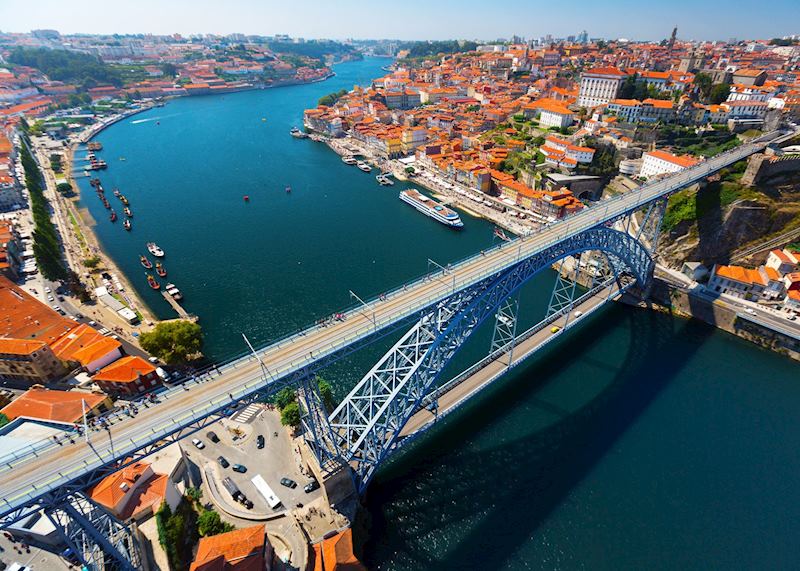
Hiking between surf spots and royal palaces in Estremadura
I recently planned a honeymoon for a couple who were fanatical about surfing and this coastal region to the north of Lisbon was their dream destination. Home to the famed 30m (100 ft) wave of Nazaré, honeymoons in Estremadura are set against abackdrop of the pounding Atlantic swells and soaring cliffs. It makes for an easy mid-way stop if your honeymoon in Portugal includes visiting both Lisbon and Porto.
You’ll find yourselves walking miles along the clifftops, watching the fearless big-wave surfers, and visiting the grand palaces and castles of Sintra — a whimsical hub of 19th century European Romantic architecture. We can arrange for you to have a private tour of Sintra’s fairy-tale landscape of royal buildings. Your guide will walk you through the fascinatingly ornate highlights of the region, ranging from the 10th-century Palácio Nacional de Sintra and the extravagant 20th century Quinta da Regaleira, whose architecture was created by opera-set designer Luigi Manini.
Where to stay in Estremadura
There is one very obvious choice of place to stay on honeymoon in Estremadura and that is the town of Óbidos. Known locally as the ”wedding present town”, Óbidos was gifted to King Dinis to his bride Isabel on their wedding day in 1282. You can stay in a grand medieval castle at Pousada Castelo Óbidos, a hotel that boasts features dating back to the 9th century.
Alternatively, you can stay in Lisbon, visiting the area on a day trip. If you’re eager to retain the castellated theme, you might like to stay at the 18th-century palace Corpo Santo Hotel. The service here is incredible, really making you feel special for a honeymoon stay. I particularly love the free popcorn machine for guests, a great option for a romantic night in.
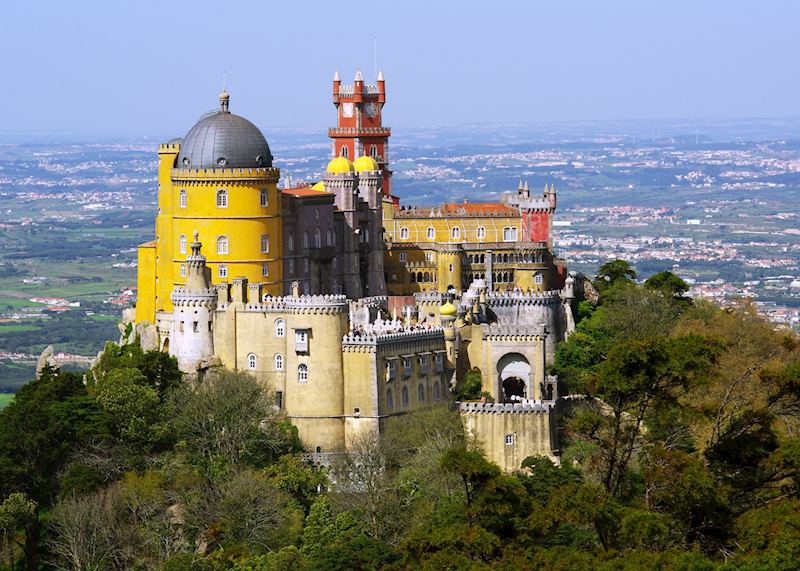
‘If music be the food of love…’ head to Lisbon
In Lisbon, you might like to start your honeymoon in Portugal with a tuk-tuk tour for two, to get your bearings. Then, spend your time in the capital exploring the city’s food, which is a major draw. An epicurean hub, Lisbon is known as the birthplace of the pastel de nata custard tarts and specializes in Atlantic seafood with dishes such as grilled sardines, octopus, and bacalhau (salted cod).
We can also arrange a private food tour here that gives you a gastronomic insight into the city’s culinary heart and ends with a hands-on demonstration of how to make the famed creamy pastries. And, in the evening, we can arrange for you to head out to a special dinner, serenaded by the region’s traditional, haunting, and passionate fado music.
Lisbon also works as a great base for day trips. You may like to explore the west coast peninsula and the town of Cascais, once a royal summer retreat with a huge array of historic buildings. Or, you can dip into the Arrábida Natural Park, near Rábida. One of Portugal’s less-visited natural parks, it's home to dense forests, limestone cliffs, and bountiful wildlife.
Alternatively, you could take a trip to the Setubal tile factory, where you’ll learn about the traditional18th-century tile-making process and create your own memento to take home in celebration of your nuptials.
Where to stay in Lisbon
If you’re not staying in the Corpo Santo, which we mentioned above, the H10 Duque de Loulé hotel in Lisbon is a good alternative. Also housed in a converted 18th-century building, it has an original elegant façade. Inside, it is a modern blend of hand-painted blue and white tiles and vast light-filled rooms. It has the added bonus of a rooftop bar, where you can enjoy panoramic views over the city while toasting your marriage with a cocktail.
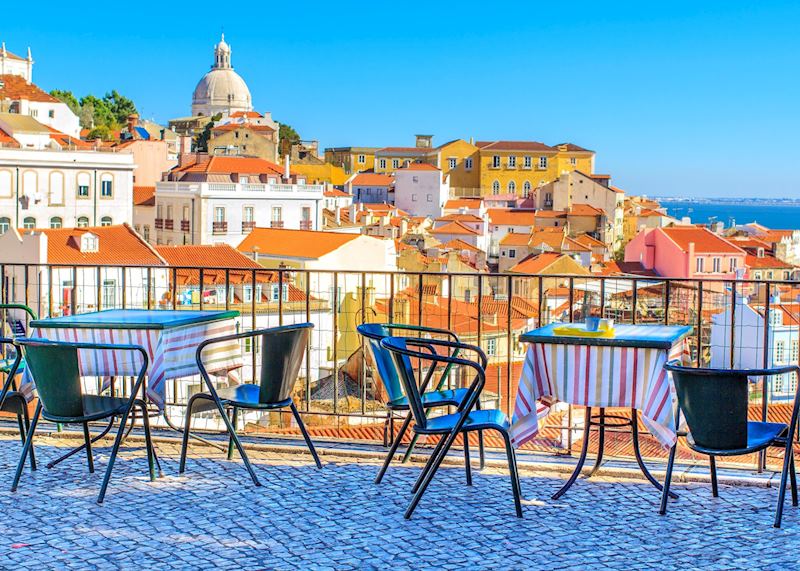
Pristine secret beaches of Comporta
One hour south of Lisbon on the coast of Vincentina you’ll find Comporta, an ideal secret hideaway for a honeymoon in Portugal, and home to some of the most exquisite beaches in the country. Miles of soft, white sand, pastel-hued beach huts, marram grass dunes and lagoon-filled nature reserves are off-set by the crisscross network of canals that irrigate the surrounding rice fields.
The area is heavily protected and, as a result, has escaped mass development and remains a tribute to its long history as a base for fishermen and rice farmers, living in low-rise, thatched cabanas.
Additionally, the small fishing village of Comporta is a secret refuge for the cognoscenti. Unfettered by mass tourism, the village is instead home to uber-modern restaurants and small independent bars that come alive at night, offering fresh-from-the-boat seafood and expansive cocktails. During the day, chic sleek beach clubs lure in a select crowd while artisanal boutiques spill out onto the streets.
Where to stay in Comporta
There are two outstanding hotels in Comporta, both ideal for a romantic Portuguese honeymoon stay. Firstly, Sublime Comporta, a woodland retreat where modernist villas and cabanas are scattered across the natural grounds. Aesthetically calming and in tune with its surroundings, the rooms boast driftwood inspired furniture offset by floor-to-ceiling glass.
The hotel boasts two pools, one of which is untreated by any chemicals, where you can swim together among the water lilies. If that’s not romantic enough, we can arrange private yoga lessons in the pavilion, cycling trips on the complimentary bikes, horseback rides along the beach, and surf lessons surrounded by dolphins. The hotel will even arrange a picnic for two beside their lake or along the pristine beach.
Secondly, Quinta da Comporta offers the chance to stay on a converted rice farm, combining traditional rural architecture with chic modern design. Founded around the principle of relaxation, you’ll find everything you need here to escape from the stresses of life. From log fires roaring under towering ceilings in the vast treatment barn to a plethora of spa treatments and swimming pools that frame the panoramic sunsets and seem to flow infinitely into the surrounding rice fields.
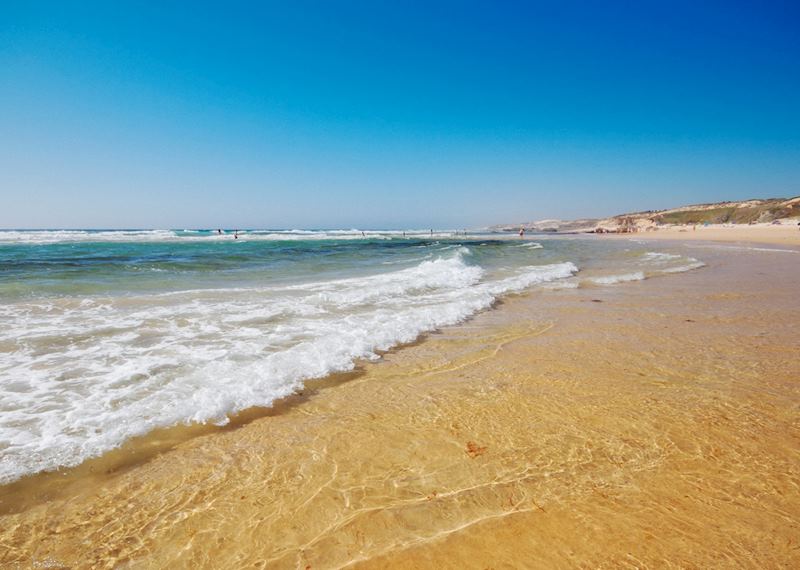
Exploring Porto from a motorcycle sidecar
In Porto, I always recommend taking a boat trip that passes underneath its six bridges to get a true feel for the city from the water. The city’s architecture is distinctive, thanks in part to the tradition of tile painting. This tour give you a chance to see that art at its most remarkable, with walls covered in blue-and-white tiles all telling important historical stories. I usually encourage visitors to go to the São Bento train station where the tile mural is vast and illustrates Porto’s whole rich past.
We can arrange for you to have a privately guided tour of the city in a multitude of ways. You might want to hop into a motorcycle sidecar and be whizzed around the highlights, ride an e-bike around the cobble-stoned streets, or simply walk in the company of your guide as they bring the city’s storied past to life, accompanying you between the main sites. We can break up this exploration by organizing an intimate lunch afloat on the Douro River.
The city is also synonymous with port wine and your guide can take you across the river to Vila Nova de Gaia, home to many of the region’s port producers. There, you can learn about the production methods and have a tasting at the renowned Graham’s port cellar.
Where to stay in Porto
The Maison Albar Hotel’s Le Monumental Palace is a luxurious hotel in the heart of Porto that exudes a 1930s style. Its Art Deco furnishings are housed within a neoclassical building known for its fine-dining French restaurant and prestigious hangout, Café Monumental, which has attracted notable visitors since the 1930s. The spa here is a wonderful place to relax together after a busy day of sightseeing.
Alternatively, you may wish to stay deep within the port-wine area of Porto. The wine-focused Yeatman sits just across the Douro River from central Porto, in the heart of Vila Nova de Gaia. Not only does it offer unbeatable views of the river and the city beyond but every room is river facing with its own terrace arranged in steps to mimic the landscape of the nearby Douro Valley. Known for its expansive spa and two-Michelin-starred restaurant, the hotel is a luxurious base from which to explore the city.
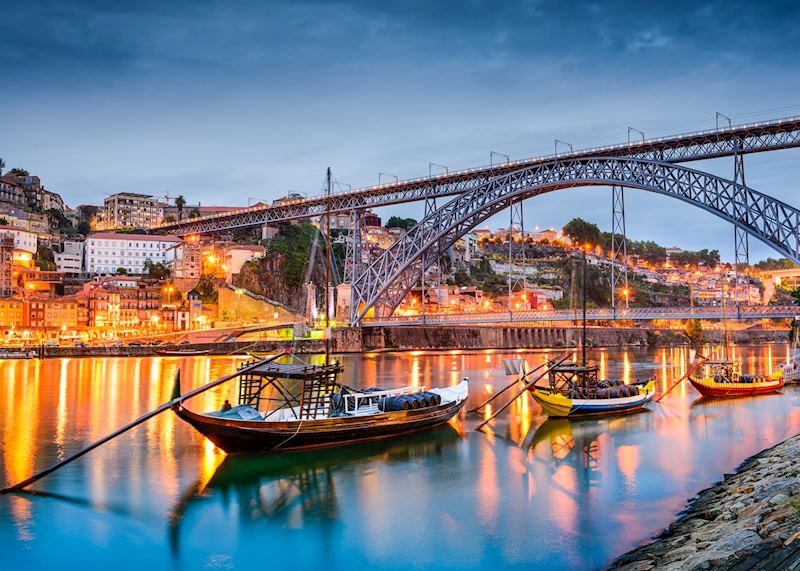
Island hopping in the Azores
Hot springs, lakes of myriad hues, volcanic wine fields, and sunset yacht rides alongside bow-riding dolphins... a honeymoon in the Azores is an experience like no other in Portugal. An autonomous part of Portugal, the islands are a great destination for a honeymoon in Portugal, either on their own or in combination with some time on the mainland. If you want to spend your time entirely in the Azores, I recommend staying on Pico, where you can easily access the other islands on day trips.
There, you’ll hike across the distinct geology of the volcanic island with an experienced guide who can explain the unusual landscape and introduce you to the renowned lava field vineyards, from where you can taste the wine of a leading winery. For the more adventurous, there are mountain bike trails, horseback expeditions, and kayaking excursions.
From Pico, you can visit the nearby island of Faial to hike the Vulcão da Caldeira mountain, with its vast dormant caldera that’s adorned by hydrangeas, which give the island its blue nickname. Or, you could visit tiny São Jorge, known as the brown island due to its long ridge of tall, brown cliffs. The highlight of a visit here is to visit the tiny churches and fajãs (volcanic formations) before tasting its eponymous cheese, a mild nutty variety with spicy undertones that's a culinary highlight across Portugal.
Where to stay in Pico
While you can stay on many of the smaller islands, for a remote romantic hideaway, Pico is ideal. It is an island untouched by tourism and has no large resorts, but I love booking couples in to stay at Vinhas do Calhau, a group of spacious apartments whose buildings are constructed from the volcanic stone that gives Pico its nickname, the grey island.
Situated right on the rugged shoreline, the hotel overlooks either the ocean or the mountain that gives the island its name. All the apartments have kitchenettes and distinctive decors in a light-filled modern style.
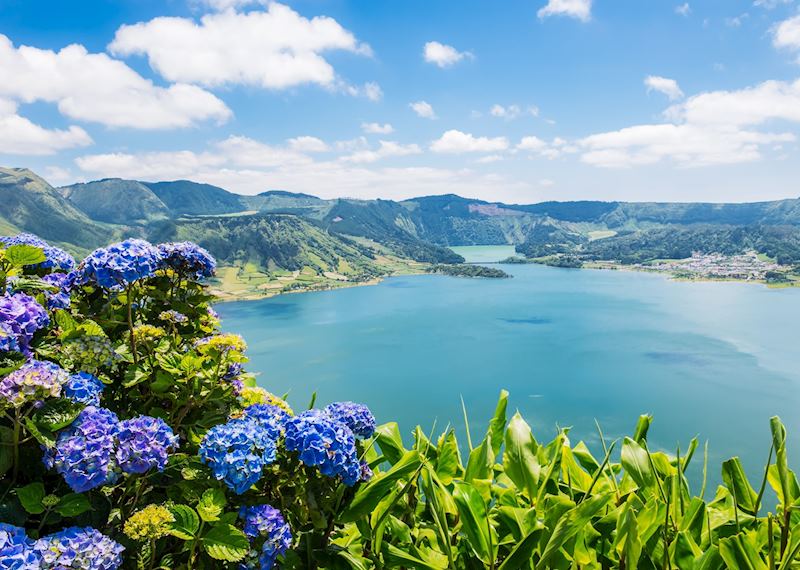
Mainland adventures and island relaxation
When I’m planning a honeymoon in Portugal, I like to combine a visit to either Porto or Lisbon followed by time in the Azores. The largest island of the archipelago, São Miguel is nicknamed Ilha Verde (the green island) due to its lush interior and soaring tree-covered peaks. It is also one of the best places to spot marine wildlife.
We can arrange for you to head out on the ocean for a private whale and dolphin spotting trip. You’ll have a half-hour briefing from a staff biologist on the 28 species that can be seen here before you don your waterproof gear and head out on the water.
While on São Miguel, you may also want to get closer to the geothermal activity. You can embark on a 4x4 journey through the verdant interior of the island up to the twin lakes of Sete Cidades where you can hike between the lakes, one bright green and one deep blue. You'll also go around the base of a dormant sunken caldera before trekking around the boiling active calderas of Furnas. To rest after this, you can visit the hot springs of the Furnas Valley, where you’ll get the chance to soak together in the thermally heated natural pools.
Where to stay on São Miguel
For easy access to the airport and the activities on São Miguel, you may wish to stay at the Octant Ponta Delgada hotel, situated just outside of the marina in central Ponta Delgada. White linens and wooden floors enhance the island feel here and you’re well placed to spot marine wildlife from its ocean facing rooms.
Based just outside central Furnas, the island’s hub of geothermal activity, the Octant Furnus Hotel has a tranquil rural feel and a retro design. It has two swimming pools that are naturally heated by the nearby springs and a restaurant that offers fresh-from-the-source Cozido das Furnas, a rich meat stew cooked underground in the volcanic heat.
Alternatively, for a black-beach getaway you could stay at Santa Bárbara Eco Resort a haven of wellness and nature. Set among the wild volcanic landscape of the island, the hotel reflects its surroundings in its use of natural materials. Guests stay in private villas surrounded by botanical lakes and are given the chance to unwind with daily yoga classes or surf lessons at the onsite surf school.
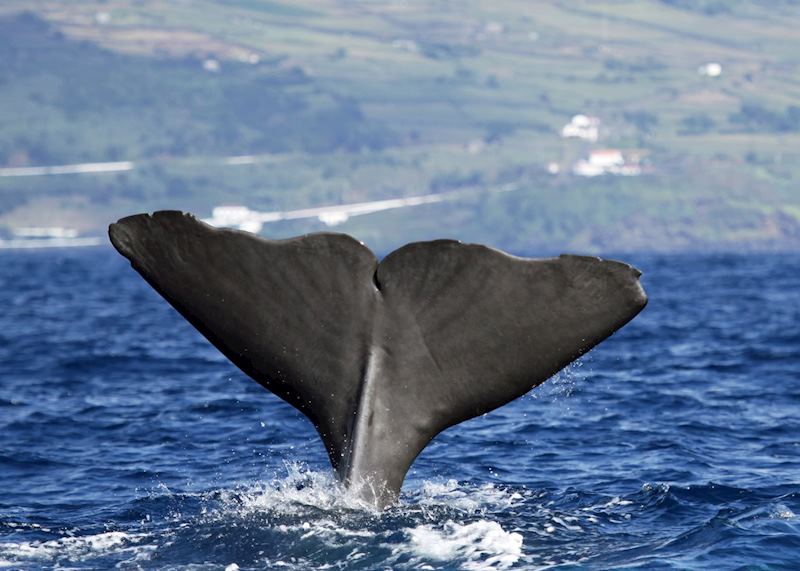
Best time to go on honeymoon in Portugal
If it works with your wedding plans, spring (March to May) is a wonderful time of year to visit Portugal, when the country is in full bloom. Alternatively, autumn (September and October) holds on to some of the summer warmth yet without the summer crowds. From June to August, Portugal gets very hot and is awash with both domestic and international visitors.



